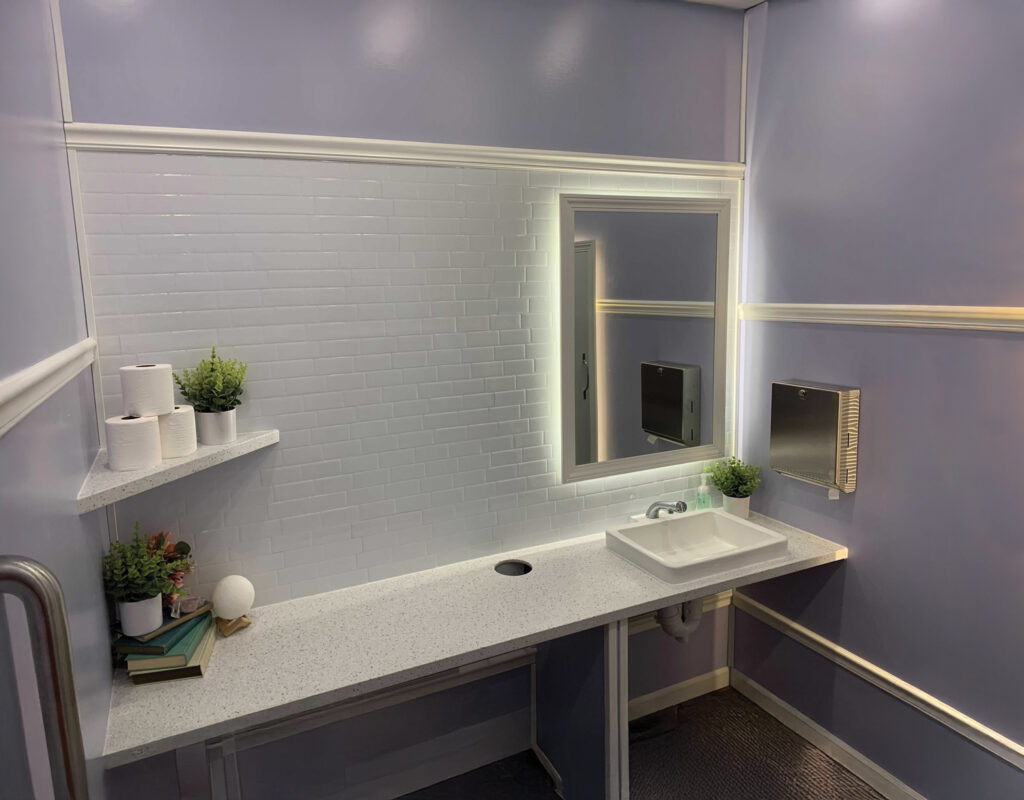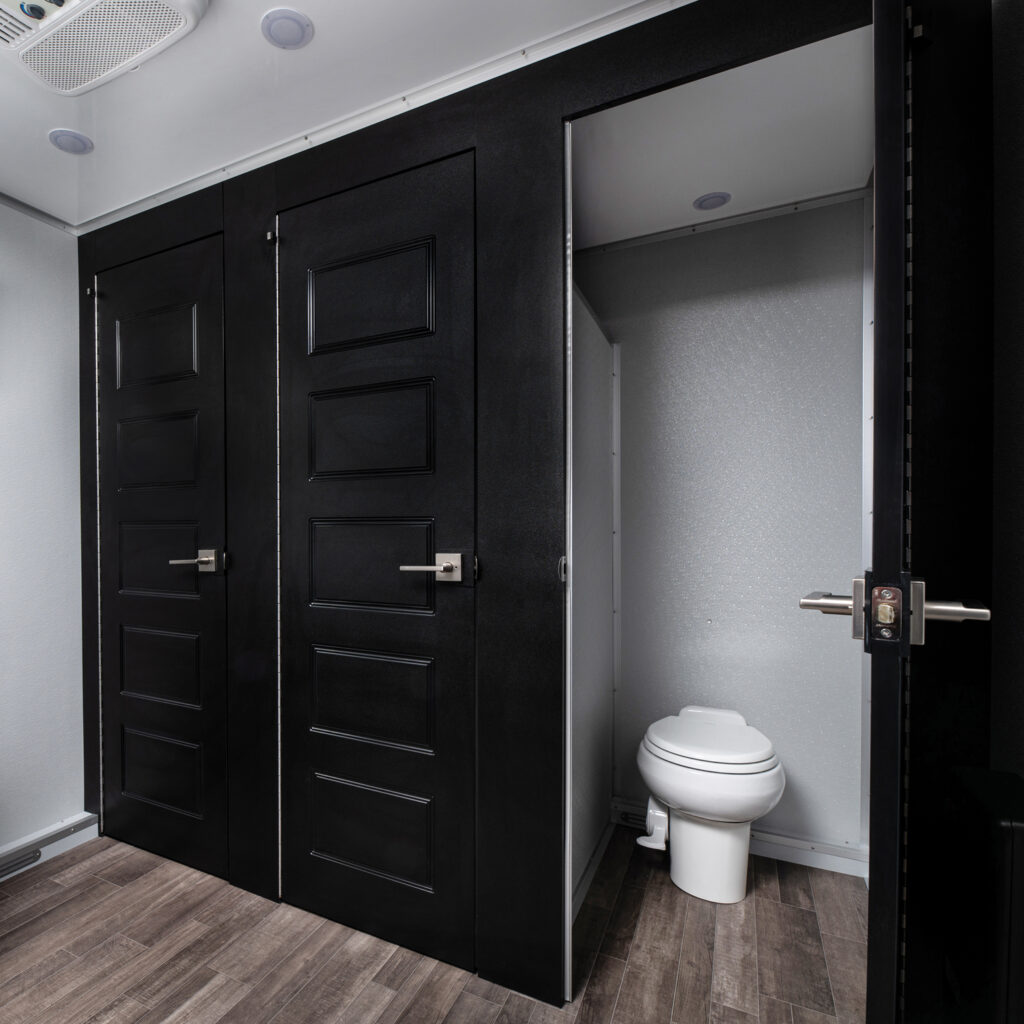Porta potties have their place, but most agree it’s not at weddings. Even for the most laid-back affairs, the presence of porta potties can have a dampening effect on the festivities, potentially causing guests to leave the celebration early. As David Sauers Jr., CEO and co-founder of Royal Restrooms, asserts, “No one wants to use a porta potty.” Certainly not a bride in a wedding dress.
This realization—underscored by an unfortunate porta-potty experience involving him, his toddler and infant—propelled the launch of his company in 2004. Headquartered in Savannah, Ga., with locations across the country, Royal Restrooms provides luxury restroom trailers, shower trailers and specialty trailers to various markets including weddings, corporate events, festivals and film productions.
Sauers started with two trailers. Today, there are approximately 1,600 trailers and counting nationwide. Available in a range of sizes from single-stall units to those with up to 16 stalls, the company’s primary focus is on smaller, individual-stall restrooms that can accommodate up to 150 guests. During the wedding season, two-stall versions, each similar to a half bath, are most popular since the stalls tend to be roomier. Each climate-controlled trailer is outfitted with flushing toilets, vanities, sinks, lighted mirrors and more.

Royal Restrooms’ newest trailer is the Vintage Series restroom. Featuring a polished stainless-steel exterior, bronzed aluminum interior walls and laminate wood flooring, it looks less utilitarian than some of their others, says Sauers, adding part of the motivation behind its creation was feedback from wedding/event planners wanting something more “Instagrammable.”
There currently are 12 of the Vintage Series, with plans to expand their numbers. Sauers says more than 60% of the company’s total inventory goes to weddings, although they also are rented for other purposes. However, the Vintage Series is almost entirely weddings and special, “very black-tie” events.
A dearth of appealing restroom options for her own wedding inspired Kasey Salvetti—along with her mother and husband—to start Luxury Restroom Trailers by Privy Chambers in 2013. The family-owned restroom-solutions provider is headquartered in Portland, Ore., serving that state as well as Washington and the Coeur d’ Alene region of Idaho, says Salvetti, marketing manager. Beginning with one trailer, the company now has more than 100, offering various styles and sizes to meet a range of needs, from weddings to high-end corporate events and construction projects.

Its fleet ranges from compact, two-stall restrooms up to 10-station units over 40 feet long. Right before the COVID-19 pandemic, the company started incorporating large-scale restrooms with private, individual stalls, each with its own entrance, toilet, sink and mirror, says Salvetti. Although Luxury Restroom Trailers still offers “shared, common-room layouts,” it’s adding more individual-stall versions.
“Beyond just social distancing, people love the enhanced privacy, gender-neutral labeling flexibility, increased tank capacity and better queue efficiency, making them ideal for both intimate gatherings and large-scale events,” she explains, adding these units have become client favorites.
Restroom interiors feature backlit mirrors, high-end fixtures such as porcelain sinks, hands-free flushing toilets, stainless-steel faucets, heating and A/C options and picture-frame wainscoting. ADA-compliant and gender-neutral versions also are available.
“Our two-stall Executive and Downtown models are specially designed with extra-wide doors and additional interior space so a ballgown can fit through with ease and with room for helpers inside,” Salvetti says. “A restroom trip in a wedding gown isn’t often a solo job.”

Game changers
Restroom trailers can be a game changer for outdoor weddings, making a huge difference in the overall experience, says Leslie Swab, customer service manager for B & B Tent and Party Rentals of Eatontown, N.J. Yet, she adds, many clients don’t even think about them until the need is brought to their attention. Providing this option allows tent and event rental companies to fill a gap in their event planning, she says.
The full-service party and event rental company began offering restroom trailers in 2020 during the pandemic. Starting with two trailers, its fleet now numbers five in four sizes: small (with two private entrances accommodating about 100 people over a four-hour period), medium, large and extra-large. The latter has five toilets and two sinks for women; and two toilets, four urinals and two sinks for men. It can accommodate about 1,100 people over a four-hour time period. In addition to weddings, the trailers also are available for birthdays and anniversary parties, sporting events and emergency situations.
Among other features, they’re outfitted with spacious stalls, porcelain foot-flush toilets, stainless-steel sinks, hands-free automatic faucets, simulated hardwood laminate flooring and simulated marble countertops, as well as climate control, LED lighting and built-in sound system.
B & B doesn’t provide customization, says Swab, explaining most clients prefer to add their own touches, such as monogramed hand towels, soaps, flowers and so on.

Sauers says their restrooms come with artificial flowers throughout, “tasteful decor,” rugs and “signature Royal Restroom butter mints.” They also stock lotion and soap as well as two-ply toilet paper. Restroom attendants are available at an additional price to ensure the facility stays fresh throughout the event.
“For weddings, we often suggest that the event florist provide small, fresh-flower arrangements for each stall,” says Sauers. “Fresh flowers in a restroom create a welcoming atmosphere and enhance the overall experience. Brides often appreciate these personal touches.”
Salvetti says removing things such as stairs and handrails, allowing a tent and stage to be built right up to the restroom to create a single large, open space, is one of the most common customizations Luxury Restroom Trailers does.
“We are also able to offer wraps and additional signage,” she says. “But the chandelier logo wrapping the corners of our restrooms from top to bottom have become a client favorite, so they often choose to leave that in place.”
Additional expenses ahead
Kyle Richardson, owner of NJ Event Services, a Stockton-based provider of portable toilets and restroom trailers, doesn’t field many customization requests when it comes to the trailers.
“We are sometimes asked to change the photos of the interior of the units and have helped planners arrange to have the correct-sized photos of the bride and groom to hang on the walls inside the units,” says Richardson, whose company serves the wedding, construction and general party markets.
He purchased the first trailer in 2018, adding this to the company’s existing inventory of approximately 300 portable toilets/porta potties. It now has six trailers consisting of two-stall through six-stall units. The demand is “definitely growing,” and he plans on expanding to 12 over the next five years.
“We purchase all of our trailers with ‘luxury’ packages,” Richardson says. “All this really means is we have higher-end finishes on walls and countertops. One of our units even has a fireplace in the ladies room to really create an ambience like no other.”
NJ Event Services’ newest trailer has a wrapped exterior. Dubbed “The Potty Shed,” it looks like an old-timey shed, complete with faux windows and window boxes. This addition has gotten the business some “very unique jobs,” says Richardson, adding they’ve even taken it out of state because brides or planners “just had to have it.”
Since acquiring restroom trailers, the company also has purchased trucks for hauling them as well as those for pumping waste, generators and additional water tanks. As Sauers’ business has grown, it’s invested in specialized equipment, including water tanks and “whisper-quiet” generators.
Additional purchases and expenses should be expected when adding restroom trailers, says Salvetti. Some of these could include hiring private servicing trucks to ensure proper tank maintenance and that the trailer is never hauled full of waste. Holding tanks, commercial hoses, extension cords, generators, decals, insurance, inspections and permitting are necessities.
Maintenance costs are another consideration for those thinking of adding these units to their inventories.
“Restroom trailers are essentially mobile septic systems paired with high-end bathrooms,” says Sauers. “If trailers are not properly cleaned, emptied and serviced, they can quickly become unusable. Regular maintenance and sanitation are critical to your investment.”
Also essential for protecting this asset is implementing proper winterization protocols, especially when not in use, says Salvetti, explaining that in freezing temperatures, even a single night of inactivity requires a full-system winterization.
Questions and cautions
One of the most common issues Swab encounters is people underestimating how frequently the restrooms will be used, which is a concern since these trailers won’t operate when at full capacity. This is why Richardson not only asks clients how many guests there will be and the ratio of men to women, but also about alcohol and the anticipated consumption.
“Believe it or not, alcohol plays a large role in how much a trailer gets used,” he says.
Salvetti also asks about the setup and take-down schedules. If during this activity there will be only one restroom on-site, additional servicing or capacity may be warranted, she explains. The “ideal queue time” is another area she covers. If the client doesn’t want to have numerous guests waiting in line, adding additional trailers or those with more stalls could be the best strategy.
In addition to the number of guests expected and the event’s duration, both of which will influence capacity and servicing decisions, Swab says they also nail down the following:
The type of wedding; knowing the style (formal, casual, themed etc.) allows them to recommend a trailer most aligned with the ambiance.
If there is access to water and electricity and if these meet trailer requirements; if not, Swab says they provide water tanks and/or generators for an additional fee.
Trailer placement: “Restroom trailers must be placed on a flat, hard surface,” she explains. “If grass is the only option, additional precautions may be necessary to prevent sinking.”
When it comes to placement, Richardson cautions that not only does the surface need to be level and solid, the location must be accessible, with enough space to get the truck and trailer into it, a sometimes-overlooked requirement.
Although rental fees for these trailers are substantially higher than those for porta potties, achieving ROI is a longer wait, says Richardson. Although the return on a porta potty can be realized within two or three rentals, this can take up to two years for a restroom trailer.
This difference in returns may narrow a bit since, according to Salvetti, prices for standard porta potties are on the upswing and “steadily increasing” because of rising expenses across the industry.
Echoing Richardson, Salvetti explains that a typical porta potty costs around $700 and generally pays for itself after a few months of rentals or several weekend-long events. On the other hand, restroom trailers usually start out at around $30,000, which could take several years or longer to pay off. This is why diligent maintenance of these trailers is critical to ensure they remain in top condition throughout this payoff period, she adds.
Although Richardson says that “from the outside looking in, it appeared relatively easy to own and operate a restroom trailer business”—likely due in part to his experience providing portable toilets—Sauers cautions onboarding these units isn’t as simple as it seems.
“Many assume they can add trailers to their offerings without much effort, but each product requires specialized care and maintenance to meet client expectations,” he says. “This is not a ‘set it and forget it’ business. Restroom trailers must be treated as a separate business with dedicated cleaning, servicing and customer support.”
“In our 21 years of experience, we’ve seen many companies add trailers only to give up a few years later,” Sauers continues. “Why? Because they underestimate the ongoing maintenance, client education and logistics. It’s a business within a business that requires dedicated focus in order to succeed.”
Pamela Mills–Senn is a freelance writer based in Seal Beach, Calif.
Thinking of adding restroom trailers to your tent and event rental inventory? Leslie Swab, customer service manager for B & B Tent and Party Rental in Eatontown, N.J., offers the following advice:
- Investigate the market. Is there a demand for restroom trailers in your area? They are most commonly found at outdoor weddings, corporate events and festivals.
- Start slowly. “Begin with one or two trailers in different sizes to gauge demand,” Swab advises. “This minimizes risk while allowing you to learn the logistics and challenges of the business.”
- Think quality not quantity. High-end details and finishes will set you apart
from competitors. - Budget for maintenance. Trailers require ongoing maintenance, deep cleaning and sanitation to keep them in top, and rentable, condition.
- Remember logistics. “Ensure you have the appropriate trucks for transport,” says Swab. “Understand the placement requirements. Train your staff in delivery, setup and breakdown procedures.”
- Provide power and water options. Not every client/site will have the necessary access to water and/or power. Be ready to offer generators and onboard water tanks (at an additional fee, of course).
Keep your ROI expectations realistic and reasonable, Swab adds. Stay compliant with all local health/safety regulations. And be prepared to educate your clients and to aggressively market the trailers.







Leave A Comment